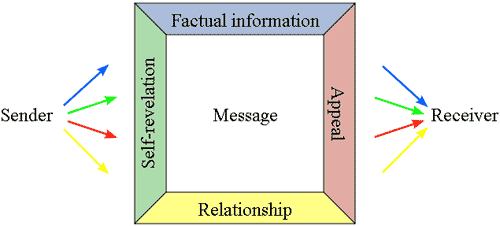The four sides model for improving climate communication
Posted on 31 July 2010 by olivermarchand
Guest post by Oliver Marchand
It is quite obvious that discussions about global warming theories can be quite emotional. Especially when debating with closely related people, a heated debate may have unwanted side effects. In a recent workshop on skeptic arguments at the swiss climate camp, a majority of the audience showed interest in my ideas how to improve our own communication when talking to skeptics. I am not at all a professional in this area, but I would like to share my ideas with you here to see if it helps us to improve our communication skills.
A classical way to analyze communication is by the "four sides model" by the German psychology professor and expert on inter personal communication Friedman Schulz von Thun. Let me explain the model in a few words. For simplicity, let's talk about a 'sender' saying something and a 'receiver' who is listening. Schulz von Thun postulates that there are four channels that we communicate on simultaneously, namely:
- Fact channel: the facts communicated
- Self-revealing channel: what the sender says about him or herself
- Relationship channel: what is being said about the relationship
- Appeal channel: what the sender wants the receiver to think or do

Simply speaking, in good communication, we neither have a mix of channels (sender said something on channel A, but receiver listened on channel B), nor a misunderstanding of the content communicated in each channel. Of course, the channels have two ends: four mouths and four ears! That means that the sender speaks in all four channels simultaneously and the receiver hears with all four ears at the same time.
Let's look at an example from debating about skeptic arguments. Imagine you're saying: "The earth is dramatically heating, that's obvious." Depending on how you're saying this and the context, the listener may be hearing very different things. Maybe you are trying to communicate the Fact channel and would like to quote all the different studies on the earth's heat in the last 100 years. But what if the listener hears "You shouldn't fly!" (Appeal channel) or "I think you are stupid not to know this by now!" (Self-revealing channel). I hope you are getting the point of the model.
Now, how can we avoid this type of miscomunication? A good start is to keep this model in the back of your head and try to communicate clearly in all those channels. My personal advice is the following:
- Focus on the fact channel and formulate the messages as such (e.g.
do not use rethorical elements like "that's obvious!"). Skeptical Science is a very good role model for this. If you don't know an answer to an argument immediately, defer answering and take your time to research, instead of inadvertently switching to other channels. - Use "I" sentences, when communicating on the Self-revealing channel. I find this channel less problematic. Let people know when you are concerned about the earth, the future or your children.
- The appeal channel is more complicated. I think that a lot of miscommunation happens on this channel, as the receiver's bad conscience is very likely to hear a lot of things on this channel that were not really said. Maybe you would really love to see the other person immediately starting to be proactive in protecting the climate ASAP, but you can't expect for people to change in a second. My personal feeling is that the facts are so clear that your appeal will come if you succeed communicating the facts.
- Most dangerous is the relationship channel. I personally try to ensure that I do not make any difference in my relationship to my communication partner, whatever the reactions to my arguments are. This is especially important for very close people. If you are soft on the person, you can be hard about the facts. So keep on listening, don't raise your voice unnecessarily, watch your face expressions, fit in a joke at times, and don't mix up other things with the debate (like indicating not going to lunch with a co-worker, because he or she didn't accept what you said about a skeptic argument).
It is difficult to follow the advice given above, because the channels are never so clearly defined and it's complicated to focus on all of these things at once, while discussing the complex matter of climate change. After all my advice is far from a simple recipe. But I think every intention of improving your communication will show on your face!































 Arguments
Arguments























 0
0  0
0






Comments